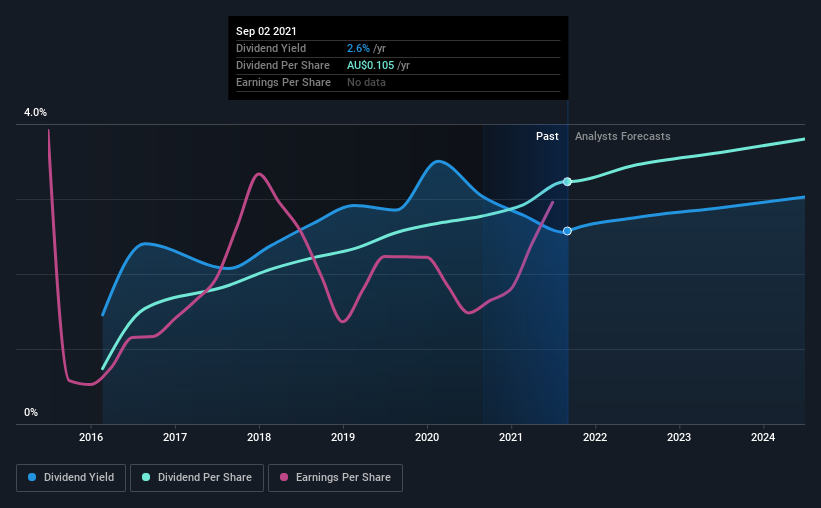PSC Insurance Group's (ASX:PSI) Dividend Will Be Increased To AU$0.065
PSC Insurance Group Limited's (ASX:PSI) dividend will be increasing to AU$0.065 on 13th of October. This takes the annual payment to 2.6% of the current stock price, which unfortunately is below what the industry is paying.
Check out our latest analysis for PSC Insurance Group
PSC Insurance Group's Earnings Easily Cover the Distributions
Even a low dividend yield can be attractive if it is sustained for years on end. The last dividend made up a very large portion of earnings and also represented 85% of free cash flows. This is usually an indication that the focus of the company is returning cash to shareholders rather than reinvesting it for growth.
Earnings per share could rise by 20.7% over the next year if things go the same way as they have for the last few years. If the dividend continues growing along recent trends, we estimate the payout ratio could reach 76%, which is on the higher side, but certainly still feasible.
PSC Insurance Group Doesn't Have A Long Payment History
PSC Insurance Group's dividend has been pretty stable for a little while now, but we will continue to be cautious until it has been demonstrated for a few more years. Since 2015, the dividend has gone from AU$0.024 to AU$0.10. This implies that the company grew its distributions at a yearly rate of about 28% over that duration. It is always nice to see strong dividend growth, but with such a short payment history we wouldn't be inclined to rely on it until a longer track record can be developed.
PSC Insurance Group Might Find It Hard To Grow Its Dividend
Investors could be attracted to the stock based on the quality of its payment history. It's encouraging to see PSC Insurance Group has been growing its earnings per share at 21% a year over the past five years. Earnings per share is growing nicely, but the company is paying out most of its earnings as dividends. This might be sustainable, but we wonder why PSC Insurance Group is not retaining those earnings to reinvest in growth.
We'd also point out that PSC Insurance Group has issued stock equal to 12% of shares outstanding. Trying to grow the dividend when issuing new shares reminds us of the ancient Greek tale of Sisyphus - perpetually pushing a boulder uphill. Companies that consistently issue new shares are often suboptimal from a dividend perspective.
Our Thoughts On PSC Insurance Group's Dividend
In summary, while it's always good to see the dividend being raised, we don't think PSC Insurance Group's payments are rock solid. Strong earnings growth means PSC Insurance Group has the potential to be a good dividend stock in the future, despite the current payments being at elevated levels. We would probably look elsewhere for an income investment.
Investors generally tend to favour companies with a consistent, stable dividend policy as opposed to those operating an irregular one. Meanwhile, despite the importance of dividend payments, they are not the only factors our readers should know when assessing a company. For instance, we've picked out 4 warning signs for PSC Insurance Group that investors should take into consideration. If you are a dividend investor, you might also want to look at our curated list of high performing dividend stock.
This article by Simply Wall St is general in nature. We provide commentary based on historical data and analyst forecasts only using an unbiased methodology and our articles are not intended to be financial advice. It does not constitute a recommendation to buy or sell any stock, and does not take account of your objectives, or your financial situation. We aim to bring you long-term focused analysis driven by fundamental data. Note that our analysis may not factor in the latest price-sensitive company announcements or qualitative material. Simply Wall St has no position in any stocks mentioned.
Have feedback on this article? Concerned about the content? Get in touch with us directly. Alternatively, email editorial-team (at) simplywallst.com.

 Yahoo Finance
Yahoo Finance 
